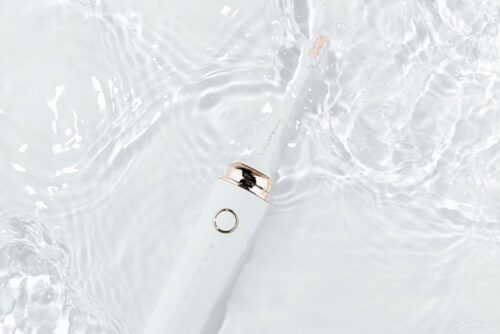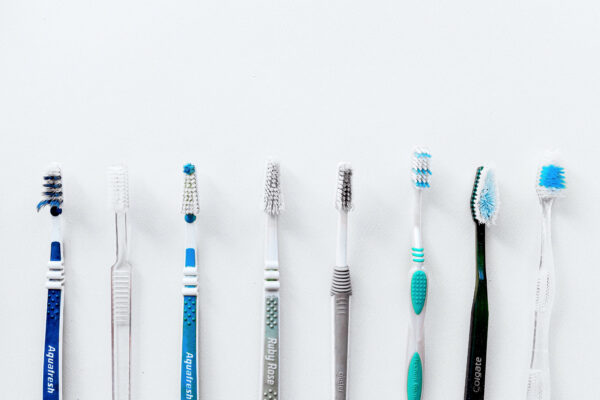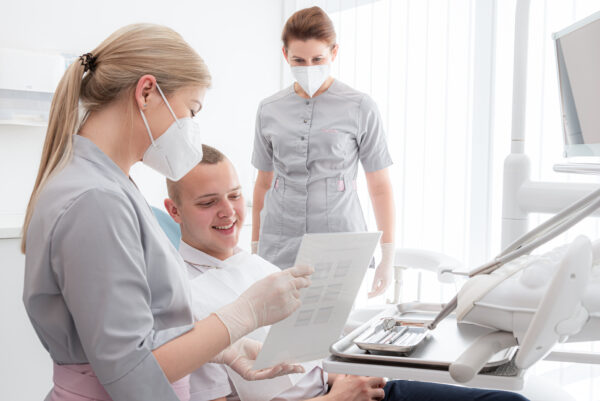
Personal oral hygiene. Why it is important and how to ensure good oral hygiene
Oral care is one of the most essential daily tasks, and a charming smile depends largely on our willpower and lifestyle choices. That's why today we're sharing with you the most important aspects of oral care that will help you achieve the smile you want.
Teeth cleaning
We recommend brushing your teeth twice a day (morning and evening). Brushing should be done in a circular, sweeping motion, as this is the best way to clean surfaces and avoid damaging the gums. Horizontal movements are used to clean away plaque build-up on the tongue, which can also be done with a tongue cleaner. It is best to use a soft or medium-hardness teeth brushwhich has be replaced every 2-3 months.when the bristles start to deform. Also for teeth brush must be replaced in case of infectious diseases.
Choice of brushes
Toothbrushes differ in the size and shape of the head, the length and thickness of the bristles, the angle of inclination of the neck, and the hardness of the toothbrush (very soft, soft, medium hard, hard and very hard).
- Very soft brushes for children, as well as people with gingivitis.
- Soft and medium hardness brushes for teenagers and adults.
- Medium-hard and hard brushing dentures.
- Special purpose brushes used to clean braces, irregular tooth positions in the dental arch and hard-to-reach surfaces.
Pharmacies can also buy tongue cleaners. Some systemic diseases (e.g. gastrointestinal diseases) tend to accumulate plaque on the tongue, which needs to be removed.
Each time you brush your teeth, the toothbrush should be rinsed thoroughly under running water and placed upright with the bristles facing upwards.

Interdental floss
Brushing your teeth with a toothbrush is not enough - our gums are often full of food residues that need to be cleaned with floss. These flosses come in different thicknesses, waxed and unwaxed, fluoride-impregnated, with a stem, etc.
We offer a choice of waxed yarnsbecause they are stronger, non-abrasive and easier to use. Flossing is recommended before brushing. When flossing, it is important not to overdo it, to be careful not to scratch the gums, and to use special floss with a rigid tip when flossing under bridges or brackets.
It is important not to use sutures as they are not sterile and can cause infection and damage to the gums.
Interdental brushes
The crotch is also cleaned with special crotch brushes. These can be of different sizes depending on the interdental area. Your dentist or oral hygienist can recommend the right interdental brush for you.
Toothpicks
Toothpicks come in different shapes (flat, triangular, round), plastic and wooden, with or without fluoride impregnation. Toothpicks do not completely remove plaque, but help to remove food residues in the gums and are more likely to be used immediately after eating. They can easily damage the gums, which is why flossing and brushing are more effective cleaning tools than toothpicks.
Toothpastes
Toothpastes can be:
- hygienic - pleasant tasting, well-cleansing, but free of therapeutic substances. Such pastes are suitable for young children, as well as for people with dentures on implants or allergies to the active ingredients in the paste;
- therapeutic-preventive - These toothpastes contain anti-caries, antibacterial, anti-inflammatory, anti-sensitising, anti-scaling, anti-inflammatory, and other substances, in addition to the usual hygienic agents. Depending on their composition, such pastes reduce tooth sensitivity, inhibit plaque formation and are used to prevent caries.
It is advisable to change pastesbecause their active ingredients take time to get used to. It is possible to vary the types of paste or to change the company, as different pastes have different ratios of substances and ingredients.
Mouthwashes
It is an additional tool in oral hygiene care. The mouthwash can be used before brushing your teeth and after eating. Rinsing before brushing your teeth will help to remove plaque, while rinsing after eating will help to remove food debris and improve breath. Rinsing for at least one minute is recommended.
Rinsing liquids can be:
- cosmetic - freshens breath and kills bacteria;
- therapeutic - helps heal gingivitis, gingivitis, periodontitis, etc.
It is better to take the healing liquids after brushing your teeth, as the active ingredients will be more effective.
Can also be used herbal decoctionse.g. chamomile inhibits inflammation, oak bark decoction inhibits bleeding gums, birch leaves and buds have a disinfectant effect, etc.
Chewing gum
Becukre chewing gum is a useful tooth decay prevention tool. Chewing promotes salivation and improves oral self-cleansing. If the chewing gum contains xylitol, it is also antibacterial. Chewing gum should be done after a meal and only for up to 10 minutes.

Oral care is one of the most important daily tasks to ensure good oral health. There are many effective products available on the market today, so it is important not to get lost in the shuffle and, if you do not know which product to choose, to seek the advice of a dentist who will recommend the right oral care products for your situation. A healthy smile is a beautiful smile.